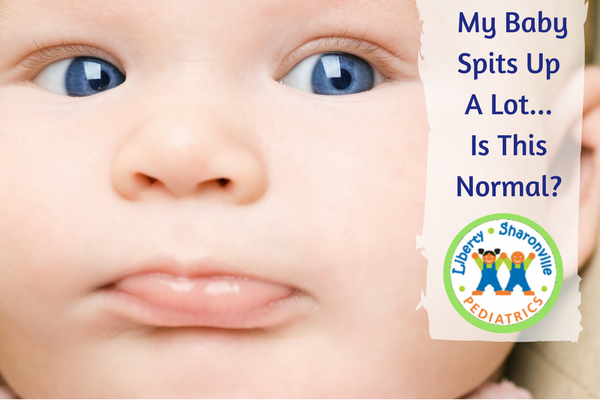Is there anything more terrifying than when your baby spits up in copious amounts after feeding? It can be quite disconcerting, especially for first time parents, and many are left wondering if their baby is getting enough nutrition. Or, if there is something seriously wrong with their child. How do we know when spitting up is normal or when it might be time to talk to the pediatrician? Our friends at Liberty Sharonville Pediatrics explain the differences, give us some tips on how to improve the situation, and let us know when it’s time to call the doctor.

GER vs GERD What does it all mean?
First of all, why so many terms and how are they different? Let’s take a closer look.
Spitting, Gastroesophageal reflux (GER) and vomiting are all describing the passage of stomach contents up into the esophagus and out of Baby, onto Mom and Mom’s shirt and Mom’s pants and just about everything else! That said, there are certain distinctions to be made between the terms.
If you’re a parent, you’re likely intimately acquainted with spitting. Whether your baby was prone to it or not, we’ve all been innocently gazing at our precious miracle when all of a sudden, with no warning, Baby’s sweet smile turns into a spitty smile and it’s time for yet another outfit change. Spitting can happen during a feeding, right after a feeding or even several minutes following a feeding. (CMB Mom Tip: Be vigilant! Spitting can strike when you least expect it!) What makes your baby spit up can be affected by a variety of factors, from how much air is swallowed during the meal, how fast the baby eats, the amount given during the meal and the length of time between feedings. For example, overfeeding with too much milk or using a bottle that flows too quickly have been known to cause spitting in a healthy child.
Gastroesophageal reflux (GER) is the result of frequent spitting before, during and after a feeding. The difference here is that GER is more chronic in nature and you can have this condition with or without esophagitis, which means inflammation of the feeding tube. You’ll have an infant with normal weight gain, but with chronic spitting.
Vomiting is different, and can best be described as more forceful. If it’s projectile and frequent, vomiting may signal an infection or, more seriously, a bowel obstruction. If vomiting comes on suddenly, is tinged green and is frequent, it requires immediate medical attention. (CMB Mom Tip: Don’t panic! Babies are tricky. Just talk to the doctor.)
These conditions can be extremely common in newborns, infants and toddlers (aside from the vomiting we mentioned above). These usually peak by about four-months-old and may start even while you’re still in the hospital or just after you get home. In the vast majority of cases, babies are (mostly) done spitting up by the time they are about one year old. Again, if these episodes are brief and don’t cause discomfort, you don’t need to be concerned.
Gastroesophageal reflux disease (GERD) is the GER associated with pain, arching, poor weight gain and decrease in intake. Along with it comes chronic wheezing or stridor. Your baby might even refuse to eat much (or at all) due to irritability and pain. If your baby is diagnosed with GERD, you and your doctor will work together to plan treatment.
What can I do to help my baby with GERD at home?
The main recommendation for babies with GERD is to keep them upright for 20 minutes after each feeding session. Also, avoid placing baby on their stomach directly after a feeding. Finally, avoid feeding too much at one time. Give your baby smaller meals more often.
What if my baby doesn’t have GERD? How do I know when I should call the doctor?
The list below gives you some warning signs to look for when you’re worried. And of course, even if your child doesn’t have these symptoms, but your mama warning bells are going off, call the doctor anyway. We always want to err on the side of caution with these sweet babies!
Dr. Otilia P. Fernandez, M.D., Liberty Sharonville Pediatrics recommends you should call your doctor:
- If the vomiting is repeated and projectile and the infant can’t keep down clear fluids over a short period of time.
- If the vomit is colored any shade of green, this could signal a bowel obstruction.
- If you notice that the vomit contains fresh or digested blood.
- If the vomit is associated with extreme pain, irritability or lethargy from your child.
- If your child has a fever along with vomiting.
- If the vomiting results in a decrease in urine output.
- If your child has a dry and tacky mouth and lips. This could signal dehydration.
- If the vomiting is associated with coughing, choking or wheezing during a feeding.
- If your child has any difficulty swallowing or complains that food is stuck in their throat. This may be a sign of foreign body or possibly an allergy.
- If your child has any history of recurrent pneumonia following vomiting episodes.
Aside from all the things we’ve listed above, we know babies like to deviate from the norm and throw us a curveball whenever possible. And so, we asked some of our Cincinnati Moms Blog contributors for their questions about spitting/vomiting.
From Casey, if I’m breastfeeding, are there any changes I can make to my diet to ease the spitting up?
If you’re breastfeeding, you might try adding probiotics into your diet. You’ll also want to avoid caffeinated beverages, sodas and acidic foods. Finally – and this goes without saying – avoid alcohol and tobacco exposure with infants, including secondhand smoke.
From Jen, if my baby has GERD, how do I know when I should try changing his formula?
Changes in your baby’s formula should be discussed with your doctor after reviewing your baby’s growth and weight gain. There are formulas with added rice starch to decrease the spitting seen with GERD. Keep in in mind, these are very different from the formulas for lactose intolerant babies and babies with milk protein allergies.













